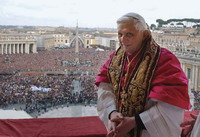Pope Benedict XVI takes efforts to stop spread of HIV virus
Pope Benedict XVI wants to intensify efforts to stop the spread of the HIV virus.

"I am asking all people of goodwill to multiply efforts to stop the spread of the HIV virus, to oppose the scorn that often strikes those affected and to take care of the sick, especially the children," Benedict told his weekly public audience in connection with World AIDS Day, which was Saturday.
"I am spiritually close to those who suffer as a result of this terrible illness as well as to their families, in particular those struck by the loss of a close relative," the pope said. "I assure my prayers for all."
Also on Wednesday, a U.N. food agency said that reducing hunger in poor countries was key to fighting AIDS and other infectious diseases.
Hunger and disease create a vicious cycle, as famished people are more likely to fall victim to infectious and chronic diseases, which then reduce their ability to provide food for themselves and their family, the Rome-based World Food Program said in a report.
Malnutrition also makes recovery more difficult even when proper drugs are available, so the international community must take care to couple medical help with food aid, the agency said in its "World Hunger Series" report for 2007.
"Food is often cited by people living with and affected by HIV/AIDS as their greatest and most important need," said Elizabeth Mataka, the U.N.'s special envoy for HIV/AIDS in Africa. "Nutrition interventions for HIV programs are often overlooked in the international HIV policy debate and they remain critically underfunded."
Speaking at a presentation of the report in Rome, Mataka said that, according to U.N. figures, the number of people affected by HIV in 2007 was 35.2 million, down from 39.5 million in 2006.
"It seems that we are witnessing a slowing down of the epidemic, but we have to do more," she said. "Setting a limit to hunger and HIV is an absolute imperative."
Subscribe to Pravda.Ru Telegram channel, Facebook, RSS!


